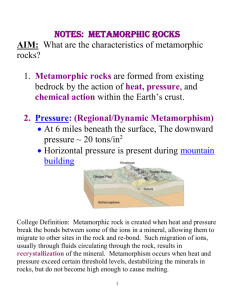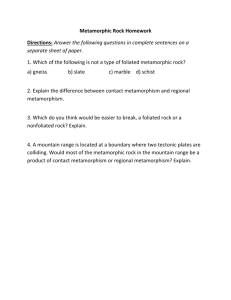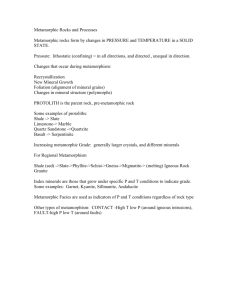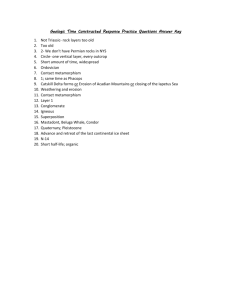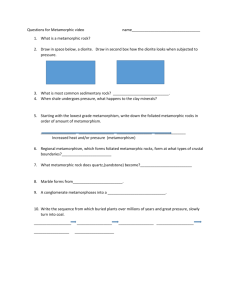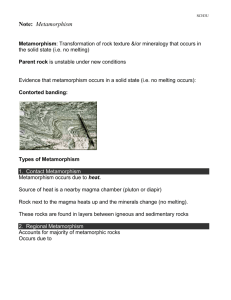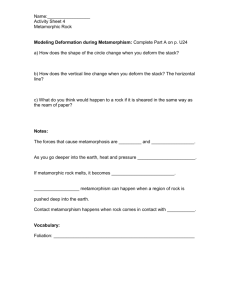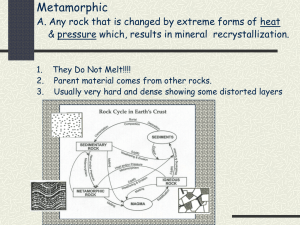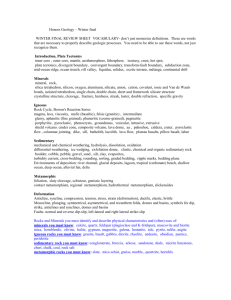Metamorphic Rocks Factors of Metamorphism Styles of
advertisement
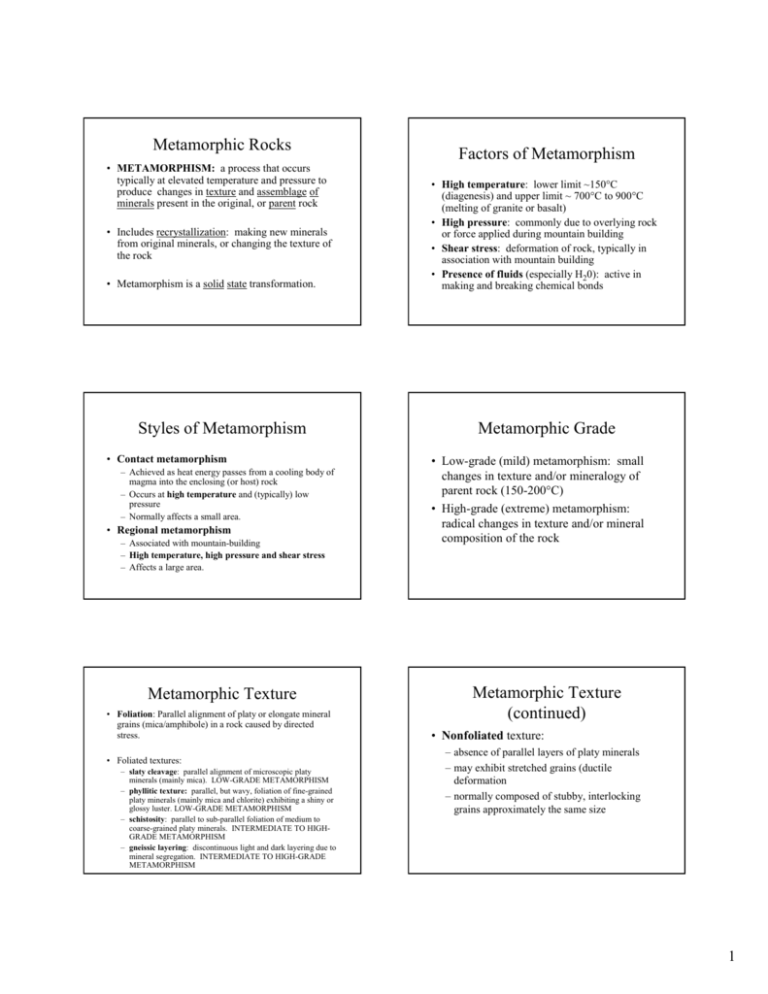
Metamorphic Rocks • METAMORPHISM: a process that occurs typically at elevated temperature and pressure to produce changes in texture and assemblage of minerals present in the original, or parent rock • Includes recrystallization: making new minerals from original minerals, or changing the texture of the rock • Metamorphism is a solid state transformation. Styles of Metamorphism • Contact metamorphism – Achieved as heat energy passes from a cooling body of magma into the enclosing (or host) rock – Occurs at high temperature and (typically) low pressure – Normally affects a small area. • Regional metamorphism – Associated with mountain-building – High temperature, high pressure and shear stress – Affects a large area. Metamorphic Texture • Foliation: Parallel alignment of platy or elongate mineral grains (mica/amphibole) in a rock caused by directed stress. • Foliated textures: – slaty cleavage: parallel alignment of microscopic platy minerals (mainly mica). LOW-GRADE METAMORPHISM – phyllitic texture: parallel, but wavy, foliation of fine-grained platy minerals (mainly mica and chlorite) exhibiting a shiny or glossy luster. LOW-GRADE METAMORPHISM – schistosity: parallel to sub-parallel foliation of medium to coarse-grained platy minerals. INTERMEDIATE TO HIGHGRADE METAMORPHISM – gneissic layering: discontinuous light and dark layering due to mineral segregation. INTERMEDIATE TO HIGH-GRADE METAMORPHISM Factors of Metamorphism • High temperature: lower limit ~150°C (diagenesis) and upper limit ~ 700°C to 900°C (melting of granite or basalt) • High pressure: commonly due to overlying rock or force applied during mountain building • Shear stress: deformation of rock, typically in association with mountain building • Presence of fluids (especially H20): active in making and breaking chemical bonds Metamorphic Grade • Low-grade (mild) metamorphism: small changes in texture and/or mineralogy of parent rock (150-200°C) • High-grade (extreme) metamorphism: radical changes in texture and/or mineral composition of the rock Metamorphic Texture (continued) • Nonfoliated texture: – absence of parallel layers of platy minerals – may exhibit stretched grains (ductile deformation – normally composed of stubby, interlocking grains approximately the same size 1 Textural Changes • Other changes that can occur during metamorphism: – Crystals grow in size. – Minerals can become segregated from one another to form compositional layering (as in gneiss). – Crystal shapes can become distorted (ductile deformation). – New minerals can form: • polymorphic transformation • reshuffling of atoms to form new minerals with no change in bulk chemical composition Mineral Assemblages Depend upon: • chemical composition of parent rock • intensity of metamorphism (involving temperature, pressure, shear stress) Mineral assemblage can change with no change in bulk chemical composition. Index Minerals Shear Stress (directed stress) • Distortion or deformation (change in shape or size, or both) • Development of lineation: single, preferred orientation of elongated crystals (such as hornblende) • Development of foliation: crystals with platy habit (such as mica) lining up parallel • Diagnostic minerals indicate restricted range of pressure-temperature conditions of metamorphism. • General appearance with increasing metamorphism: – Low grade--------------------------------------!high grade – Mica appears (clay disappears)!garnet and staurolite appear; amphibole increases!pyroxene increases (mica disappears) – H2O-rich--------------------------------------! H2O-absent Bulk Composition Increasing Metamorphic Grade Mudstone/shale→ slate → phyllite → schist → gneiss (fine-grained) → (medium-coarse grained) • Although a mineral assemblage may change with an increasing grade of metamorphism, the bulk chemical composition of the original parent rock commonly does not change (except for loss of water). • Examples: – – – – Quartz sandstone-----------------quartzite Limestone/dolomite---------------marble Basalt--------------------------------amphibolite Granite------------------------------granite gneiss 2
